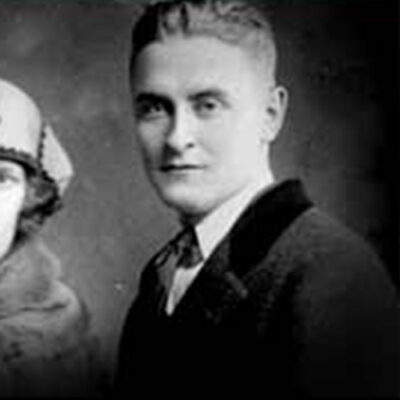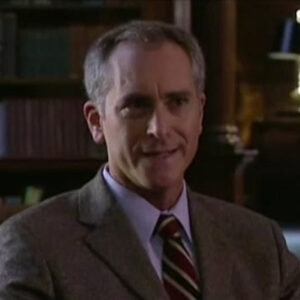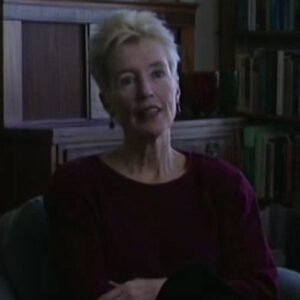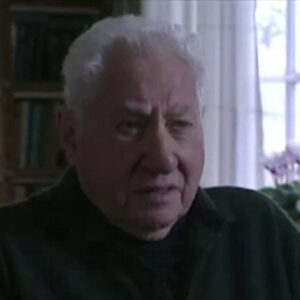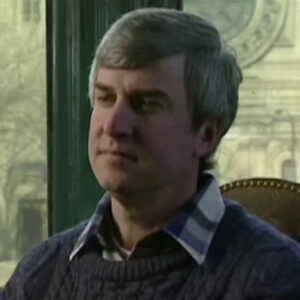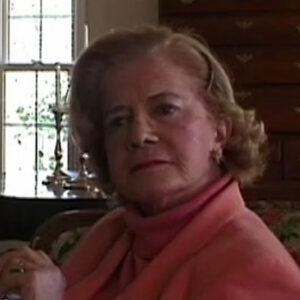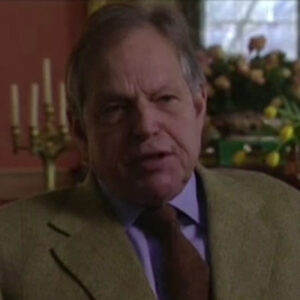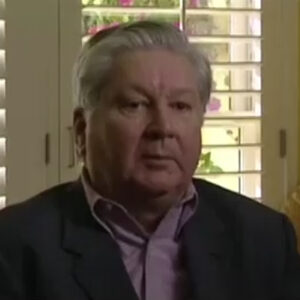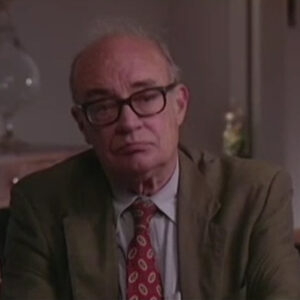Speaker I don’t fully understand the phenomenon, but I do know that Fitzgerald seems to speak to American readers in a way that no other author really does. He has a feel and understanding for the country, the culture, for aspiration, for love. And he captures readers in a way that no other author I really have dealt with does capture them. He also understands money. And this is a culture that’s about money. I think he writes better about money than any writer of his generation, perhaps of the century.
Speaker And what is when you say Fitzgerald, his magic? Is that magic in the marketplace and what’s happening with Fitzgerald in the marketplace these these days? As if I didn’t know because a lot of people don’t know as opposed to when he.
Speaker Di Fitzgerald and Zelda forged powerful, appealing and enduring myths about themselves, they created those images, we didn’t create them. The biographers and critics who came along later, they did not create the Fitzgerald legend. The Fitzgeralds themselves created those legends. And I think they continue to be appealing and if you will, marketable the stories that readers like to hear that viewers like to see. And I think that accounts for some of the magic. Also the writing itself, the style, the beauty of the language, its lyricism, all of that, which is so very hard to describe, captures readers and holds them.
Speaker When Scott and Zelda were inventing themselves in that, I guess the first thing that comes to mind is the 20s was this why why were they inventing themselves and how were they?
Speaker Were they were they just were they to kids who were kind of show offs? And how did that happen?
Speaker Those legends in part were spontaneous, but they were also calculated. Fitz-Gerald early on understood that he needed a particular identity as a writer and that it would be up to him to forge that identity. He did it through his writing. He did it through his behavior, through his efforts to appeal to the press, to interviewers, to what we today would call the media. And he really did it very well and quite consciously, I think. So he invented as he went along, but did so very successfully. One of the more interesting things, though, is that when he tried to reinvent himself in the second half of his career in the 30s as a poet of remorse and regret, he was less successful right then because the public knew him too well as the prophet of the Jazz Age. But we who have come along later, can now look back and see that he had just as good a sense of the 30s of the best period in American history.
Speaker And what was the first convention with as much energy as you can get? What was the character that Scott chose to invent for himself and how was it received and what was the vehicle for it?
Speaker Fitzgerald wanted it all in that first invention. He wanted to be seen as bright, talented, handsome, charming, funny, a little while slightly out of control, but also as an artist and as someone who had a very clear feeling for where his country was going just after the First World War. Part of that first creation also involved Zelda, because everyone knew and he continued to remind them that she was his inspiration and his his muse. So with her collaboration, he created her also as a prototype, if you will, and also as his great love. But they knew what they were doing. They knew how to charm newspaper reporters. They knew how to work book reviewers. They knew how to get in the papers. They knew how to have their name in front of people when they opened the paper at breakfast or when they looked in the evening at the Saturday Evening Post. And Fitzgerald had all of that quite consciously, he understood that it was part of the creation of his career.
Speaker This year, it seems that we’re going to talk about a number of the paradoxes and maybe, I hope, the central paradox, but there’s also a paradox. I think Scott seemed to be quite bedrock confident that he was a great writer, even as a kid. I don’t know, somehow this was something. And yet he was fractured with self-doubt about who he was, his standing desperate for acceptance. But there was that. And so, as in all of us, there were paradoxes. But that’s a big one. And then he seemed to be showing off desperately for the for the persona. And I’m wondering, could you help me with that? If you if you think that’s another valid notion that he that he had this. Did he have this strange central confidence that he could really write at the same time he was frantically trying to invent himself in every possible direction?
Speaker Fitzgerald had great faith in his own talent. He always had that, I think he never fully lost it, but he also understood that that was not enough, that if he were to reach the audience that he wanted, if he were to be more than just a total rewriter, but he had also to have an image that would promote the writings. And that’s actually still true today. Many people read Fitzgerald as much for the life and for the legends as they do for what they understand to be the meanings of his stories and novels. Have lost through that question a little bit.
Speaker You want to pose it, just want to find out. I just want it. Is there a paradox between the world and it’s kind of bedrock belief in himself and his strain of severe self-criticism and uncertainty about. Right. Right. Right.
Speaker Right. You.
Speaker Self-doubt is very common in writers, especially in talented ones, and Fitzgerald was no exception. On the one hand, he did have that solid confidence in his abilities. He didn’t suffer from writer’s block. There was even a kind of cockiness when he sat down to put words on paper. He knew he could do it. He knew he could charm people and edify them and instruct them. He knew that he could create beautiful prose.
Speaker But like many writers, he desired prose and he wanted notice. And he got a lot of it, though, again, like many writers that never fully satisfied him and he never really believed it when he was praised. So he had to write more. And so he had to be in the papers again. And it was a kind of a cycle that he went through. You can see it clearly in his career.
Speaker And it’s that cycle, an echo of the larger. Paradox of.
Speaker Aspiring to something personally and being riveted by it and journalistically or as a writer and yet seeing through it the old money, the the the East Coast, quote unquote, old money.
Speaker Right.
Speaker Culture and class that I got so hooked with when when we were first talking. Can you get me to help me with that is if I hadn’t stumbled in.
Speaker Mm hmm. Let me put you talking about Oh. Class and East Coast and the double vision.
Speaker Um, see a little bit of that again. I’m really I’m really just hoping. Did Scott understand the hollow heart of the very thing he was socially aspiring to.
Speaker Mm.
Speaker And he will certainly do did, but yeah, it is a paradox.
Speaker That’s the central paradox in all of Fitzgerald’s writings. It’s the conflict and the tension in his novels and stories that gives them that particular edge that they still have. If Fitzgerald had simply been someone who worshipped the glamour of the rich, if he were someone who was only enchanted with money, we wouldn’t be very interested in him today. Likewise, if he had stayed, the Midwestern boy who came east and cast a rather jaundiced eye on the corruptions of the rich, on their failings and their inabilities to live up to that glamour, if he were only that kind of writer, we wouldn’t be very interested in him. But there’s a tension or a friction that he never really resolved in his writings, that he continued to work out a kind of dialectic, really, and that carried him right through his career. That paradox, it never really leaves the writings.
Speaker When Nick Carraway at the end of Gatsby goes back to the Midwest, which I, of course, think is St. Paul, I don’t remember not being mentioned in St. Paul.
Speaker I guess I kind of thought that that was a triumph, not a defeat, that there was a an understanding that maybe this glimmer of what had attracted him to the east and him Fitzgerald of the East had its shortcomings and going back to something more stable wasn’t necessarily a bad thing. Can you tell me, what do you think about Nick’s retreat and is there any connection with Scott?
Speaker U.N. Nick Caraways retreat is a kind of victory, it’s a rejection of what he’s found in the East, it’s a moral judgment on the corruption of the idle rich, but it is a sort of retreat all the same, because you must realize in The Great Gatsby that those people from the middle classes who aspire to the level of the Buchanans, those people are destroyed. Both of the Wilsons are destroyed, as is Gatsby. And in some ways, Nick, who is a perceptive fellow, can see that and he must wonder if he’s next. I don’t think that Nick believes that he will be killed, that he will lose his life, as those characters did, but he doesn’t want to hang around. It’s a dangerous place. He’s going back to where it’s safe, the old warm heart of the universe. That’s what he’s after.
Speaker And did Scott understand this?
Speaker The dangerousness of inherited money right from the get go, even at Princeton, I’m now thinking this side of paradise. When I reread it, I was a little bit astonished to see that this undercurrent was there as well.
Speaker When did where do you get that? Where’d that come from?
Speaker Fitzgerald’s understanding the little bit of now, and I just flubbed that one word, Fitzgerald’s understanding of the rich came from observation, very careful observation. When he came to Princeton, he was enthusiastic. He threw himself into the whole myth of that university. But even that early, he was able to withdraw and to observe. And he had early on a very clear fix on those members of his class who were there with inherited wealth, who were waiting for trust funds to descend upon them. And I think he understood that the anticipation of that kind of money did something to these people, to their treatment of others, to their own behavior. In some ways, it might have killed any innate romanticism or sense of aspiration that those people had. He picked up on that. He was also very sharp in picking up on the academic pretenses of any big reputable university, which, after all, are not terribly hard to pick up on. And I think he got a clear fix early on also on the scholars and savants at Princeton and understood that for unintuitive talent like his own, they really had nothing they could teach him.
Speaker Was Scott an intellectual? No, nor did he pretend to be, but he was a great reader.
Speaker Let me start that one over. He can give me the Yeah, you need intellectual. Yeah.
Speaker You know, Fitzgerald was no intellectual and didn’t pretend to be his friends at Princeton, John Peel Bishop, for instance, and Edmund Wilson, never tired of telling him that he should be an intellectual, that he should read better books and so forth. But he had a pretty good sense that his talents were not in that direction. He was a great reader. He was one of the best read people of his generation at Princeton, and he was largely self educated, as great writers are. But I don’t think he ever pretended to be an intellectual or an academic that would have been anathema to him.
Speaker Why?
Speaker Fitzgerald probably understood that to approach reading and learning in an intellectual fashion would have destroyed his own talent or certainly compromised it. He was a romantic.
Speaker He was intuitive. He had a wonderful ear for language and a fine sense of history and of society. But he didn’t want to analyze in the way that, say, a sociologist might, nor did he read literature in that way with the analytical he read intuitively and with his heart.
Speaker Class and money, I want to just refer to it earlier now before I forget. Scott’s grasp interpretation, life experience of the American dream is something that one strives for but can never quite attain, or when you have a much better phrase than that, together with understanding of the mercantile engine, so much of it is. An enormous center, I think, was for me when I was trying to grapple with it and you put it together for me. What is that?
Speaker What is he he articulates a kind of the American dream with the.
Speaker There’s a phrase in Fitzgerald’s writings, he speaks of the golden moment when life was literally a dream. And I think Fitzgerald understood that all of us are striving for that golden moment when everything comes together, when money and love and aspiration and success and all those things that we strive for coalesce or crystallize in just a moment.
Speaker That’s what we think we want. And we believe that once that point is achieved, it will endure.
Speaker It will go on. The Fitzgerald can too short for that, he understood that the moment is evanescent. It doesn’t last. It’s only for that instant and then it goes away. The important thing is driving. The important thing is the green.
Speaker However, what would be worth having it and letting it slip away?
Speaker Well, Heidi, the Philippines, a number of extended golden moments in his life, probably the one that we remember him best for is when he was young. He was in his early 20s. He was in New York. The presses were pounding out the side of life. He was in the newspapers every day and felt it was by his side.
Speaker They were newly married, as he put it. Later, they were like two children in a bright, unexplored morn. They went about the city. Everything worked for them. Everything was magic. That was a fine moment for him. There was another point in his career just after the completion of The Great Gatsby, when he had achieved a lot of what he wanted with that book. There was a great deal of critical praise for him and a new kind of respect for him as an artist that he had deeply desired. But even at that very moment, he could already feel it all beginning to break up and slip away from him in his own instabilities in Zelda’s mental problems and in the constant struggle for money to keep their lifestyle going the way it was.
Speaker Fitzgerald is brilliant, though, in the way that he can anticipate those times coming and in his understanding that no golden moment can last.
Speaker What was we OK? What was good?
Speaker Which I know well, we’ll get to the novel of your thesis choice, but wait for what? When did you first become kind of attracted to afflicted with, afflicted by smitten by F. Scott Fitzgerald writing?
Speaker Well, I read Fitzgerald backwards, that is to say, the first novel that I read about him was Tender is the Night, and it puzzled me. It seemed to me a novel that was shot through with many kinds of ambivalences, with a very fine understanding of the European scene and of character and of human behavior and also of failure and loss. But I was very young when I read the novel and I didn’t really understand what had happened to Dick Diver. So I read backwards. Then I read The Great Gatsby, then I read The Beautiful and Damned, and finally I read The Side of Paradise and it began to make sense. So then I turned around and took it in the proper chronological way. But I’ve always been glad that I encountered the late Fitzgerald first, because I think he’s a deeper, more thoughtful, more sophisticated writer in the 1930s than in the 20s.
Speaker And if you can help me a little bit on tender is the night I did that. And well, let’s talk about his process of writing, but. Just not chronologically, but did that novel come easily to him in terms of just struggling to get it out? And what are the parallels between dick diver Nicole Scott and Zelda? Is it is it is it fair to make some parallels and what was happening at the time?
Speaker You want me to talk first about the difficulties you had in getting that novel going? Those were really two questions you asked me.
Speaker Exactly. And we can do them separately or one can lead into the other. OK. However, it’s natural.
Speaker Yeah. You know, I can see a lead in this may make a longer comment and you can drop it in the middle, you know.
Speaker Fitzgerald had more difficulty with Tinder’s the night than with any other novel that he wrote. Remarkably, it began as a novel of matricide. It was based on a sensational case on the West Coast called the Ellingsen Matricide, a young girl named Dorothy Ellingsen, who was a flapper who hung out with bad influences, jazz musicians and so forth, became enraged at her mother and shot and killed her. Fitzgerald thought he might make something of that material. And so he transformed the protagonist of his novel to be into a young movie technician, someone quite talented with visual images, which Fitzgerald understood were going to be the images of the coming century. He named this person Francis Malarky, and he put him on the French Riviera, where he came in contact with the sophisticated couple that became Dickin Nicole Niver later on. But it didn’t work. I’ve read all the way through those early drafts and the finish is beautiful. The observed brilliance of the expatriates and of the life on the Riviera is fully realized in those drafts. But Fitzgerald simply could not establish any kind of basis for matricide that would carry the novel along. Fitzgerald seems to have realized fairly quickly, though, that matricide as a motivating factor in Tinder’s and I simply wouldn’t work. And the catalyst for his completion of the novel was, in fact, Zelda’s mental breakdown. He observed her very closely, even as he was heartbroken by what was happening to her. But like any good writer, he also understood that this was good material. You can’t be too hard on him for that. He and Zelda were both used to taking their lives and making them into myths, seeing them transformed into fiction. It was an old story for them, but this time he was dealing with something that was very, very close to his to his life and to his heart. And it gave a kind of authenticity and authority to tender is the night that otherwise I think it wouldn’t have had. So he was writing even as he was observing what was happening to Zelda, and he put right into the novel some of the letters that she wrote to him, some of the things that happened to her while she was under treatment. So in that sense, you can see that Dick and Nicole Divx or Scott and Zelda Fitzgerald. But it’s an imperfect match because they are also, at the same time, the Murphys, Gerald and Sara, in their brilliance and charm and need to control, which Gerald Murphy had and which Dick Diver also has, for instance, and in Sarah Murphy’s skill with people and her great beauty and her charm. So all of it is is mixed in a very skillful way into characters that do cohere. It’s not enough just to say that Scott and Zelda or Gerald and Sara or Dick and Nicole doesn’t work.
Speaker Is it fair to say it’s often dangerous to say that an author or an artist of any kind is taking their life and passing it through some internal prism of various qualities, qualities, and then and then emerges as art or the fictional form? In Scott’s case, it seemed to me it almost was necessary for him to live through something before he wanted to write it almost almost in a journalistic sense of having to be there.
Speaker Could you help me? Is that is that a fair notion? And and how did it manifest itself?
Speaker Fitzgerald was his own best material and he knew it. So he constantly tried to. I’m going to start that again immediately, consciously. Fitzgerald was his own best material, and he knew it, he consciously lived the kind of life that could be transformed into fiction, and then he wrote the fiction and then he continued to live it out in his life. It’s a kind of cyclical, complex interrelationship between the life and the writings. That’s really very difficult to trace out. Now, when one first begins to read Fitzgerald, it looks very simple. You say, oh, right. He had this experience. He wrote the story. He did this. He wrote this novel. But the more you learn about it, the more complex it becomes. So that to try to understand how he transmogrified the life into the writings is very, very difficult.
Speaker His doctor, Dick Diver, sort of slow disappearance into upstate New York is the part of Scott that that represents what is going to.
Speaker Is that Scott’s constant understanding that things are going to last and assess in this period that he’s he’s he’s headed for trouble?
Speaker Hmm. You know, oh, we roll in and I can start.
Speaker OK, Dick Navroz disappearance at the end of Tender is the night was entirely planned by Fitzgerald. It was something that he called the dying fall. It was a sense that he wanted at the end of that novel of his major character not going through some cataclysmic end, but fading away. And it’s tied into a concept that Fitzgerald had at that time that he called emotional bankruptcy. It was the notion that one sometimes makes bad investments with one’s emotional capital and that what one does is to invest in people or hopes or dreams that were unwise, that were bad investments. And so you’re left emotionally bankrupt as Dick Diver is at the end of the novel with nothing left and no way to restore your capital.
Speaker Did Scott sense through Dick Diver, I mean, as reflected a bit in Dick Diver, that he himself.
Speaker We’re running out of emotional and or did he have an idea that it was a finite resource that could be mined out by the time he finished tender is the night Fitzgerald did fear that he had used up his resources and that there was nothing left. And indeed, there was a rather long period, 1935, 36, 37, in which he seemed to be prostrate, in which it looked as if he would never recover the spark of inspiration that he had had earlier. But I think that was really for Fitzgerald, a period of pausing, considering reinventing himself and planning his comeback. And had he lived? I think he would have done it. He was working very well on the last tycoon when he died, his his last novel. And it’s a great shame that he couldn’t have finished it because there’s a new, more mature, more considered style in that novel. That’s fascinating to observe and also a wonderful character. And Catherine, who is unlike any other female in Fitzgerald’s writings, but tragically, he died and he wasn’t able to come to that maturity. I do think, though, that he rediscovered his inspiration and his confidence when he was in Hollywood.
Speaker Emotional. Talent as a resource, how to it’s kind of a feeling and then we’ve done this a little bit, but they feel that this resource had to be carefully conserved or just that you were going to run out of it. And how did he how did he did it come easily to him? Was he an actual writer?
Speaker That’s a good question. Whatever the natural Reutter is, I would say yes, you know.
Speaker Fitzgerald was a natural writer. He had resources of language and perception that he had great confidence in, and he knew that he could always call upon them. He also had quick responses to people and was a good judge of them so that he could sketch in characters very skillfully, too. But I do think that at certain points of his career, Fitzgerald worried that inspiration had left him, and he tried, sometimes frantically, to stimulate himself by what he did, where he went, what he observed. He was not a contemplative writer. He was not a writer who could sit alone in a study and simply dream up his scenes and stories and people he had to go observe so that there are reliable accounts, for instance, of him going into the emergency room of a hospital in Baltimore and watching the people as they came and went. And not so much taking notes, not so much looking for the specific detail, but for the feel and the sense of the place. He was always very good at capturing that sort of thing, the feel of a room in a cocktail party or the feel of a landscape on the Riviera or the look of the sea.
Speaker And he when he if you could help me with this last act of of the trip to Hollywood, what did that represent? Where was he? What was he doing out of him? And what was the writing that emerged from.
Speaker When Fitzgerald went to Hollywood, he was going west and he went there to rediscover himself, to explore a new form. It was a form that always fascinated him. The movies he sensed probably as early as anyone among his peers the great power of moving images and the great authority that the movies would come to have in explaining to us our hopes and our dreams and our emotional lives. I think he wanted to learn how to control that medium so that he could reach ever wider audiences. He never really did it, though, because Fitzgerald finally was an artist who worked in the medium of words rather than in a visual medium. He tried, but it was simply not something that came naturally to him. Also, he didn’t do very well with the system of collaboration that Hollywood then required. He didn’t work well with others. He had his own imagination. He had his own vision, and that’s what he wanted to capture.
Speaker And how does your simultaneously represent his attempts to resurrect or test the depth of his remaining DNA writer’s talent?
Speaker Hollywood gave Fitzgerald new material, and it’s instructive that when he no longer could write scripts for the movie studios, but he turned immediately to what he had always been able to do, and that is to put words on paper so that he began again to write short stories and to conceive the novel The Last Tycoon that would capture all he had seen in Hollywood, all of its hopes and aspirations and dreams, but also its hollowness and the cynicism with which the industry proceeded. All of that. He understood very well and I think would have captured in the last tycoon had he completed it.
Speaker How do you do with his writing, in your view? How did did in The Last Tycoon and this in his what turned out to be the final serious act of writing that he did? He did he still have it? Was he getting better? Yeah.
Speaker Fitzgerald was getting better as he wrote The Last Tycoon, he was experimenting with a style that rely less on simile and metaphor and figurative language. It was a leaner, more compact style one that he had worked out in some short stories that he was writing at about that time. I think he understood that he could no longer rely on pretty language to getting by and that he needed to make a turn in his own composing habits if he were to capture a new audience.
Speaker And how far did he get with that novel? How incomplete is it? Do you think?
Speaker It’s hard to say how long the last tycoon would have been, Fitzgerald’s intention was to write a short, dramatic novel, something very disciplined in the mold of The Great Gatsby. But the evidence of the drafts is that he probably would have produced something more akin to Tinder’s the night, that is to say, a full length novel, one that captured the panorama of the West Coast and of a large cast of characters rather than the rather limited stage of The Great Gatsby.
Speaker This is important, I think, my own problem with Fitzgerald.
Speaker I really want to find out what what’s the downside here, not about the character of Scott.
Speaker We know there’s a lot of them still out there, but I always have trouble with his writing a female character. So I think they seem to stick like an old and not cartoonish, but pretty close to it, with some exceptions. I don’t know whether do you have any problems with his good right? Is the only consistent solution shallow ground water for this guy who.
Speaker The female characters in Fitzgerald’s early fiction, the fiction of the first half of his career or rather stereotyped. The problem was that he created a female character who became marketable for him, and magazine editors expected that character. She was shallow, she was frivolous. She was willful, beautiful, charming, calculating. But he repeated her over and over. And I think he understood that he had become trapped with that particular kind of woman. As a matter of fact, there’s a story that Fitzgerald wrote in the mid 1930s in which one can see him trying to create that kind of standard female character, and he finally becomes so irritated with her that he literally stuffs her with dynamite and detonates her, explodes. It’s a wonderful story, but of course, he never published it because no magazine editor would have touched it. What Fitzgerald was finding toward the end of his career was the ability to penetrate into a much more complex female psyche. Perhaps, interestingly enough, based on Sheila Graham, who was his companion in Hollywood, she had had a remarkable life herself. And Fitzgerald was being exposed there to a number of women who had personalities and backgrounds that he just wasn’t familiar with. So he was curious. He observed he talked to them, he learned about them. And I believe that had he lived to write for 20 or more years, he would have created more complex female characters in his fiction.
Speaker Any other consistent problems that you’ve had with Fitzgerald as a writer, just that we’re not annoyed you or that you observed as as close to you.
Speaker Oh.
Speaker Because Fitzgerald wrote so much for commercial magazines, he had to write plotted stories, that is to say stories that follow the kind of formula they would begin with action or dialogue. They would progress to a climax. They would be applauded sometimes trick stories that had a clever twist at the end. But actually, Fitzgerald was not particularly good at that kind of plotting. He was not O’Henry, thank goodness. And so what he really did was to recycle the same plots over and over and rely on his facility with language to carry him through. One can become a little impatient with that sort of thing, especially when it’s played out over 160 odd stories. But in his best stories and in his fiction that we remember him for, he really didn’t rely on plot in the same way there. What he did was to explore character and motivation and social behavior, and those were his great strengths.
Speaker Mechanical question, but I got to ask it now, Scott went to Hollywood and wrote a lot of short, went to Hollywood, but separate thing, also desperately wrote short stories because he was constantly broke. He spent like crazy. They didn’t seem to own very much, but could at business. I mean, just looking at the ledger and reading his letters to Max Perkins, he was this guy who was on the ropes financially, you know.
Speaker Absolutely. The.
Speaker When you study Fitzgerald’s career, he always seems to be broke. He always seems to be in the red. But what you learn is that Fitzgerald wanted to be in debt. It was one of the reasons, one of the techniques he had for getting himself to the writing table on the few occasions in his career when Fitzgerald had a lot of money, say a windfall from movie rights or from serial rights for a novel he didn’t write at all. He seems to have needed the prodding of debt. He seems to have needed to be in the red to make himself write under a kind of self-imposed pressure. And then he would deliver and then the money would come and then the cycle would continue. A lot of writers do that sort of thing. They create hurdles for themselves. They create emergencies. I think Fitzgerald liked that kind of emotional friction. I think it kept the words flowing fascinating.
Speaker And I had never realized or thought of in that way. There was Scott temperamentally.
Speaker An outsider, meaning he was outside the barrier wall initially, as you said the other day at that months ago.
Speaker He never was accepted at Princeton, still as an St.Paul almost.
Speaker Forget it. He’s the guy who didn’t come back and has not been forgiven.
Speaker And I’m sure I’m leaving at least one other institution. What about that? Was this marvelous outsider’s view just somehow had to.
Speaker It was I think it was deliberate.
Speaker And you like it better? Oh, sure, yeah. Yeah.
Speaker Fitzgerald was an outsider, and he sought that status all through his life, the restless moves, the inability to settle down, the lack of any fixed or permanent address. All of that, I think, was deliberate with Fitzgerald. He didn’t really want to belong. He wanted to observe, but he wanted to observe and move on. In that sense, it’s too bad in a way that his writings and his own image and aura have entered the canon and are now accepted. As a matter of fact, when Fitzgerald was excluded at death from the Catholic cemetery, always rather liked that. I felt that was where he should be. But he was disinterred and moved into the sacred ground later after death, after he had become accepted. But the symbolism of the grave outside the sanctified ground, I always thought that was more appropriate.
Speaker This is probably stupid question, but if Scott had lived or had had experienced this enormous success, what is a three hundred fifty thousand copies a year of just Gatsby?
Speaker I mean, this country, might he have.
Speaker Wanted to.
Speaker Celebrate his fame to the point of self-destruction, consciously to continue the cycle, or is that just ridiculous to hypothetical? No, it’s a good question. Um.
Speaker If Fitzgerald had lived to see the fame that his works and his life attracted after his death, he would have known how to handle it better the second time around. I think the first time he was finding his way without a lot of confidence, learning how to be a celebrity and learning how to handle public attention in his 20s in a way that was awkward. He made mistakes. He engaged in some gauche behavior. I think the second time, as a more mature man, he would have understood better the engines of fame, the sources of celebrity. And of course, he would have written about it because he understood it. He would have been someone who could have explained to us all that goes into celebrity, the great rewards of it, but also the price that one must pay.
Speaker When you get from Alfio and the research office and everything that led to her, what did you learn about the process of Scotts right now? You might have heard it before. And could you explain it briefly?
Speaker Trimmel is an early version of The Great Gatsby. It’s Gatsby just before Fitzgerald turned it into the novel that has since become famous. It’s a very good book. It’s a clever novel of manners. It’s beautifully written, closely observed, but it lacks that element of myth, that aura that the final book possesses. Fitzgerald turned from Malkia into The Great Gatsby in one final burst of revision, which he performed on the galley sheets, which were long typeset sheets of the text of the novel. He re-entered the world of The Great Gatsby and transformed it into the book that we now know. What you learn when you study Fitzgerald’s manuscripts is that he was not a facile writer. Certainly his prose looks that way. It looks as if the words simply flowed, as if he wrote the same way the birds sing without thinking about it. What you learn, though, is that he achieved that brilliant style through great labour and through much revision. Often his first drafts are a fairly pedestrian. It’s only in revision in Fitzgerald’s listening to the sound of the prose that that brilliant style emerges. You can certainly see that same thing operating in the revision of Cromwell Tremaglia into The Great Gatsby. QIO has some brilliant passages, but it’s not all linked together and there are a few false modes. What’s remarkable is to observe Fitzgerald zeroing in on those spots where his pen had played him falls and revising them or cutting them all together.
Speaker Francis Crowe rang his secretary at the time of last. I can’t describe to me that Scott would taste around reading, saying these lines out loud. I don’t know if I didn’t go into it very deeply, whatever it was. That part of it was the sounding of language, part of his style. I don’t only know that.
Speaker You know, I really don’t know that, and I’d prefer not to to fulminate on it.
Speaker Oh, that’s interesting.
Speaker It’s interesting if it’s true because it sounds right. It sounds as if he would speak the lines and listen to them.
Speaker I’ll give you that.
Speaker That sounds right. Fitzgerald had a wonderful ear for language, and I’m sure he wanted to hear how the lines sounded. Another writer who did that, by the way, was Charles Dickens, who would pace around the room and look in the mirror and assume different voices and listen to how it all sounded. And of course, Fitzgerald and Dickens have a lot in common. Both were wonderful observers and masters of dialogue.
Speaker Just on the heels of what you said, I am always with all my other problems with Fitzgerald’s writing of this music, his sense of being able to infuse the atmosphere around you with the music of the language.
Speaker Is that I guess I want to ask you what what is that quality kind of writer? Is that is that truly exceptional? Can one be a great writer and not understand the music of the language? Is it is that just a surface gift?
Speaker Certainly you can be a great writer without possessing a great style, Theodore Dreiser is a good example of that, and he’s a writer whom Fitzgerald admired greatly. But Fitzgerald knew that he couldn’t be Dreiser, that for him he needed to use his innate sense of the music of the language in order to tease out the meanings and the complexities of characterization that he wanted. How he did it. I don’t know. It was a kind of magic. Maybe we can call it talent, a gift. Certainly. Fitzgerald revised, reconsidered, rethought. But finally, when the time came down to put the magic words on the paper, he could do it.
Speaker And did he do it? There was always a substrate of.
Speaker That the tension of the dream, in other words, must combine this and they were left with with with with a content that was very often profound and quite dark. And I think the lyricism and. Right, right. Yeah.
Speaker Um, you can be fooled by that style. You can skate along on the surface of Fitzgerald’s prose, admiring the figurative language and the similes and the metaphors. And you can miss the deeper meanings, the substratum, layer of observation and melancholy and deep understanding of a culture. So you have to be careful as a reader. You don’t want to be distracted by the special effects.
Speaker Can you help me with the almost names and dates a little bit of just the flow from because this script has landed a lot of pay and then we have a Turnbull and Peaches Fenny and others who were sort of there.
Speaker And it was the coincidence of the struggle with tender is the night to write it and the beginning of Zelda’s breakdown, which are the second.
Speaker Zelda Fitzgerald’s first breakdown came in 1930, and for a time, I think both she and Fitzgerald didn’t understand what was happening to her. It seemed just an episode. It was something that would pass. But as time went along, I believe he began to understand that she would never be will or whole again. This troubled him deeply and made him feel very guilty. But like all writers, he understood that these were emotions that he could capture in his prose. And so he began to write about it. And that was the catalyst for tender is the night Fitzgerald’s effort to understand what had happened to Zelda, what had happened to him as a result, and then in a kind of fanciful dreaming that he had his belief that somehow she might draw from him sanity and wholeness, leaving him drained. But her will again, that’s what happens in the novel. But of course, it didn’t in real life.
Speaker Was that maybe a quiet fear on his part that she might somehow get well at his expense?
Speaker I think Fitzgerald wanted Zelda to get well again, and he understood that it would take a price and that he would have to pay it. I do believe he was prepared to pay that price, not just the money that he had to earn, but the kind of emotional turmoil that he had to go through. But it didn’t work that way. And finally, I do think he came to fear that in her destruction, he would also be pulled down and be destroyed himself.
Speaker He seemed to have a real feeling for wanting to improve people, whether it was a chauffeur who stuttered or Eleanor Turnbull who didn’t look correct or was sort of a black sheep of the family or anybody that was really a he was a one man.
Speaker He seemed to derive great energy. Now, when. When Silva.
Speaker Her say Meatball’s, it seems that he was absolutely enraged by this. I mean, he was this was this was self-improvement too far. And I don’t know what I don’t know why the guilt about Zelda in the first place and why was he so rough about this, her entering his writer’s domain when I think he’d given her some encouragement about writing and co-authored some articles, Fitzgerald felt great guilt over his wife’s breakdown.
Speaker He certainly had been told by her family that he was the cause of it all. And I think in some ways he believed that certainly if Zelda had never left Montgomery, she would have lived a very different life. Probably she would have married a successful man, perhaps a banker, and would have been the bill of society. After a while, her zany antics would probably have passed away as she got older and she would have perhaps lived a rather placid life. But we have to remember that Zelda would probably not have aspired to be an artist or a dancer or a writer if she had not been in the environment that Fitzgerald introduced her to. She was there with talented, accomplished people, and after a while she got tired of being the subject of her writer husband fantasies. She wanted an identity for herself, and so she sorted. Fitzgerald probably wasn’t entirely prepared for that and did not understand the new role that she wanted to fulfill.
Speaker And so his reaction to save me the walls was really not typical of him. Fitzgerald encouraged Zelda all through her life, and he was her greatest fan. He truly was, but saved me. The walls came to him at a time when he was very vulnerable, when he felt depressed in all kinds of ways, emotionally and financially. And I think he saw it. The novel saved me the walls as maybe one of the worst manifestations of Zelda’s personality, a self-destructive side and a generally destructive side that sometimes manifested itself. I’ve never thought that the novel shows her at her best, and it certainly did not elicit from him his best behavior.
Speaker I don’t quite understand. How would he have seen it, that is. Her self-destructive side, her novel saying she wants to keep the payment for us place.
Speaker Hmm. I don’t know.
Speaker I’m I never have been able to talk real well about that whole episode because I don’t know why they behave the way they did.
Speaker Oh, you can put it down to a kind of. What would I say? Fitzgerald was paying the bills at the hospital and he didn’t want to see a novel written on his money that would be attacking, but that’s the small I think it was more than that, wasn’t she?
Speaker She was now entering his domain. Mm hmm. He had carved this out struggle with a novel, and she was working right into it. Mm hmm.
Speaker Well, I’ll give you a let me let me give you one comment that maybe you’ll be able to work in that I’m fairly confident of. And then that’s probably all I can say about it.
Speaker We need to remember that saved me the walls, Zelda’s novel that we read today is not the novel that Scott read right after she had written it. What we read is the revised version. The earliest version doesn’t survive, but according to Fitzgerald, it was or at least he took it to be a very direct attack on him. So he was impatient with her. He was putting aside work on his own novel in order to manufacture commercial short fiction to pay for the psychiatric bills. And then as part of the therapy, a novel was to be written that would attack and embarrass him. And also that would use much of the material that he wanted to use in Tender is the night so one can understand his reaction. I don’t think that Fitzgerald’s reaction to the first version of Save Me the Walls was typical of him throughout his life, over the long sweep. I think he was under a lot of pressure then and did not behave as he normally would have because he encouraged Zelda and he wanted her to fulfill herself. But I think was very puzzled by the way she chose to do so.
Speaker Why did you feel guilty about so I mean, I know I’ve heard for a number of people that he really felt guilty and I guess I don’t know why.
Speaker Well, Fitzgerald had a habit of guilt, which is to say that he had a habit of assuming responsibility for what happened not only to him, but to the people who had to live with him. And most directly, that would be Zelda and Scottie. I think with Zelda, he felt guilty because he had put her into situations in which she had to live up to the dream that he had created of her. And perhaps he feared that she finally wasn’t up to it and that the effort to be a dream had destroyed her.
Speaker One more I keep saying one more, if you take a deep breath, I think this will be the last one.
Speaker All right. I’m running out of time. I know. And I know I’m frozen in this world. I know you’re doing great, but we’ll stop.
Speaker Ernest Hemingway and Scott, I. It seemed to me. That at one point, Scott had a plea for mercy. Ernest Hemingway and yet really there was a generosity of spirit on Scott’s part and he was really impressed. And I don’t think Ernest Hemingway was a mean fellow, but I felt I feel personally sort of outraged that he did what he did when the guy was completely down and out.
Speaker Was this just a constant seesaw kind of competition that overwhelmed a relationship?
Speaker Fitzgerald and Hemingway were competitive. All good writers are, but we have to remember that most of what Hemingway said about Fitzgerald came after Fitzgerald’s death. There was, of course, the famous slur on Fitzgerald in the snows of Kilimanjaro, in which Hemingway wrote in Esquire magazine about poor Scott Fitzgerald and his worship of the rich. But that was just a line. It was later in a moveable feast that Hemingway really attacked Fitzgerald. I think Hemingway’s problem was that he assumed after Fitzgerald’s death that that particular competitor was out of the way, that Fitzgerald had written one pretty novel, The Great Gatsby, but that was all, and that Fitzgerald would be a minor figure safely out of the competition. But in the 1950s, the late 1950s, when Hemingway was writing A Moveable Feast, Fitzgerald Starr was again ascending and Hemingway’s was going in the other direction. And so it was entirely typical of Hemingway that he would lash out in the way that he did, though very subtly, I must say, it’s a marvelous job of character assassination.

